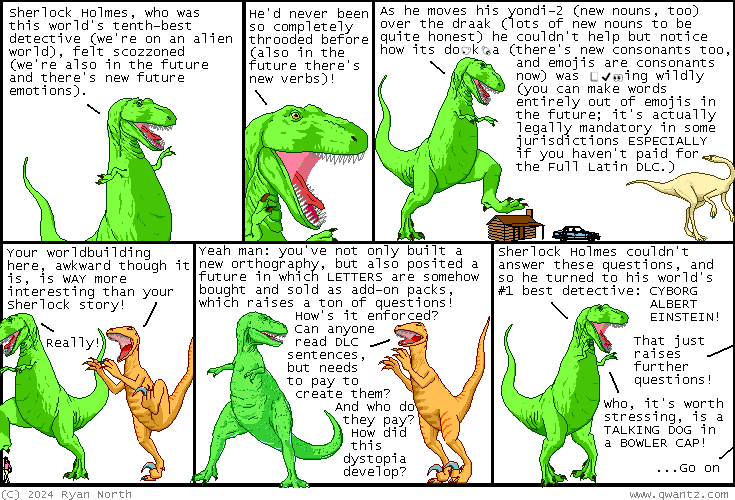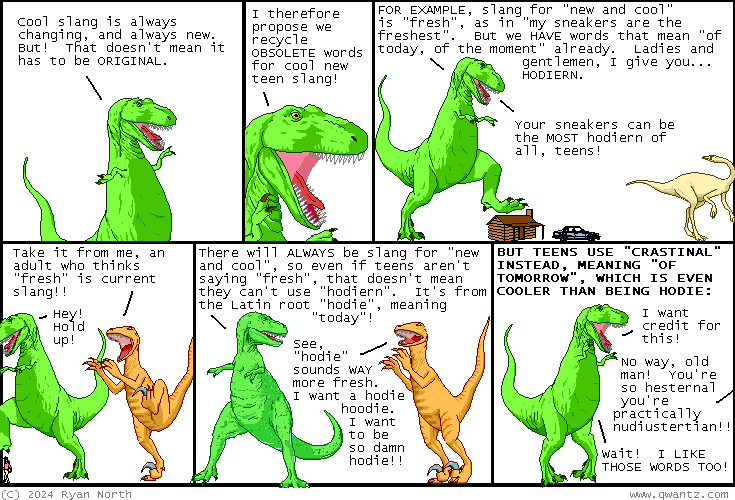New worlds, words, and letters
« previous post | next post »
A recent strip from Dinosaur Comics:
Mouseover title: "stop, you fool! you're building a world far too quickly and far too awesome! no narrative will ever live up to it!!"
Mouseover title: "hesternal means "of or pertaining to yesterday" and long-time dino comics readers already know and love and use "nudiustertian", meaning "the day before yesterday". you can tell a long-time dino comics readers by how hodie they sound AND ARE!!"


JPL said,
April 15, 2024 @ 8:56 pm
Admittedly, a lot of grist for the linguistics mill. But why did he say "on an alien world"? 'on' is for planets; 'world' is for universes. So I would have preferred "We're in the fictional world" (I mean THEE fictional world, the world of fiction). We don't need the future. I'm tired of all the futurism; we have all the possible possibilities right now in the fictional world, including all of the linguistic innovations that follow in the comic. "new emotions": do you mean new words for currently recognized emotions, new distinctions in the previous understanding of existing emotions, or genuinely novel ways of expressing affect that need their own labels. But new lexemes are usually based somehow on the existing lexical and morphological repertoire (a process which betrays a history), rather than neologism, whose shapes are completely unrelated to those of any previous word. (It never works in science either.) You've only got symbols for consonants, not new consonants, for which you would have to describe how they're produced. 'cool' is current slang in all possible worlds, regardless of the temporal dimension. Etc.
Michèle Sharik Pituley said,
April 15, 2024 @ 11:35 pm
@JPL: "world" can also mean "planet".
"Strange New Worlds" (Star Trek) doesn't mean universes; it means planets.
JPL said,
April 16, 2024 @ 1:54 am
@MSP:
I know it CAN mean "planet" ("We sailed around the world."), but I was more interested in the "being enveloped in a universe" sense, because I didn't want "planets"; I wanted the world of fiction to be one of the possible universes, infinite in possibilities, including temporal ones. (After all, we already have dinosaurs stepping on houses.) I took the phrase "this world's" in the first panel to be the dinosaur referring to the world he was living in (not on), along with Sherlock Holmes, the world of the comic, the world of literature and imagination in general, and all the rest of the weirdness.
(BTW, the stress on "can" (above) brings that element to the foreground, where before, as an unstressed auxiliary, its sense was (sort of) in the background. (Not the more common categorical difference case.))
bks said,
April 16, 2024 @ 8:08 am
https://en.wikipedia.org/wiki/On_Beyond_Zebra!
Cervantes said,
April 16, 2024 @ 9:43 am
Of course there have been societies in which it was illegal to teach some categories of people to read. (We don't have to look very far actually.) So yeah, it's enforceable. There are also innumerable examples of secret languages and alphabets, known only to the elect. So this is not really absurd.
Rodger C said,
April 16, 2024 @ 12:29 pm
Hodiern, modern, sempitern,
Angelicall regyne!
–Dunbar
JPL said,
April 16, 2024 @ 2:59 pm
@MSG:
Sorry, in looking again at my first comment, i should have made clear that when I asked, "Why did he say "on an alien world?", I was not raising a grammatical question, but suggesting that the author was missing a chance, thinking in terms of planets and futures instead of universes (the "possible worlds" of the philosophers). (I'm sure someone has written a novel in which their characters get to meet famous characters from other people's novels, e.g. IOW, "I would have preferred" expressed a literary rather than a linguistic preference.)
JPL said,
April 16, 2024 @ 3:01 pm
Correction: MSP, not MSG.
Haamu said,
April 16, 2024 @ 4:25 pm
Funny how each of us can be transfixed by something different.
For me it's "bowler cap," an object I don't think I've heard of before. This seems to be an alternative universe that has something even cuter than a talking dog in a bowler hat.
J.W. Brewer said,
April 16, 2024 @ 7:59 pm
Quoth the online Stanford Encyclopedia of Philosophy: "The idea of possible worlds is evocative and appealing. However, possible worlds failed to gain any real traction among philosophers until the 1960s when they were invoked to provide the conceptual underpinnings of some powerful developments in modal logic. Only then did questions of their nature become a matter of the highest philosophical importance." By the Sixties they could have instead talked of potential universes, but apparently chose not to. Perhaps they regarded the echo of Voltaire's Pangloss as a feature rather than a bug? Of course in many contexts world-as-planet and world-as-universe is not a meaningful distinction because the universe beyond the planet-immediately-at-hand is not salient. If neither person referenced in a stock phrase like "She meant the world to him" is likely to have engaged or in the future engage in space travel, there's no need to worry about what she will or won't mean if he's off on the moons of Saturn.
Terry Hunt said,
April 17, 2024 @ 11:53 am
@ JPL — "I'm sure someone has written a novel in which their characters get to meet famous characters from other people's novels . . ."
This is a not-uncommon device in Fantasy and Science Fiction. Among many such works, there are the 'Harold Shea' short-story series by L. Sprague de Camp and Fletcher Pratt, Silverlock by John Myers Myers, and the 12-novel 'Timewars' series by Simon Hawke.
RfP said,
April 17, 2024 @ 2:27 pm
@JPL
I would like to put in a good word for prosodic considerations as a possible impetus for the choice of “world” over universe.
(And perhaps etymological ones, as well, since “world” is not only shorter and simpler, but also comes from the basic English wordstock.)
It’s fascinating to me how little attention we tend to pay to the way that some very good writers devote what other, equally skilled writers might feel is an inordinate amount of care to how their writing sounds.
JPL said,
April 17, 2024 @ 5:37 pm
@RfP:
But I only suggested changing "on" to "in", not changing "world" to "universe".
BTW, There seem to be at issue here (possibly among others) two main senses of the lexeme 'world', distinguished in terms of the topological relation to another "thing-object", to which we can apply ad hoc (and not very good) labels: exterior (the "planet" sense) and interior (the "universe" sense). Much else follows. The "universe" sense can have trivial uses, as in "Wayne's world". (Philosophers also use 'world' a lot in the "universe" sense to talk about what living beings have to interact with and make sense of in their pursuit of happiness, the "world of experience"; but they're not thinking of "universe" as the term in astrophysics. "Environment" is perhaps a better label, as in the biological usage of "organism and environment".) Anyway, that's the change I wanted, keeping "world".
Cervantes said,
April 18, 2024 @ 7:45 am
BTW, speaking of Sherlock Holmes, the story The Dancing Men is about an invented alphabet.
RfP said,
April 18, 2024 @ 3:03 pm
@JPL
My apologies. I completely misread your comment!